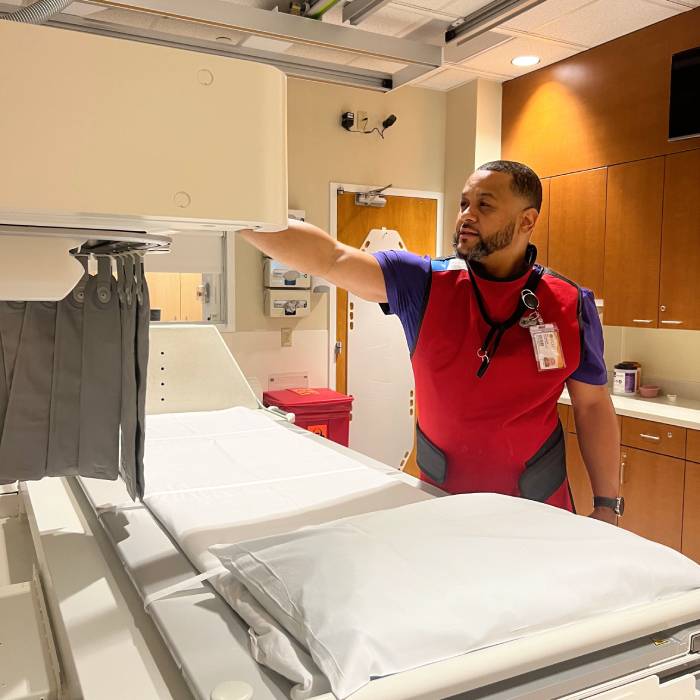From the battlefield to the X-ray suite: Joe McCampbell’s mission at VCU
 As part of the exit experience when retiring from the U.S. Army after 21 years, Joe McCampbell took an assessment that recommended future careers for him to consider. One of them – radiation sciences – was spot on the money.
As part of the exit experience when retiring from the U.S. Army after 21 years, Joe McCampbell took an assessment that recommended future careers for him to consider. One of them – radiation sciences – was spot on the money.
Playing football with his fellow servicemen left him with a torn Achilles tendon, and he became fascinated by the images in his own MRIs and X-rays. That interest sparked his post-Army direction.
Today, when McCampbell walks into a clinic, he’s not just a student: He’s a listener, a problem-solver and a steady presence for patients who are often scared and hurting. He’s bringing the precision, adaptability and people-first mindset from his military career to a new kind of service.
“I love helping people,” said McCampbell, a student in VCU’s Radiation Sciences. “Anybody that comes through the door is not on a winning streak. So it’s my job to help them try to get a win while they're here.”
While in the Army, McCampbell served domestically at Forts Benning, Gregg-Adams (formerly Lee) and Sill, as well as overseas at Camp Casey in Korea, with assignments that ranged from vehicle mechanic to general’s aide to convoy security. He was deployed four times to Iraq and once to Kuwait. Along the way, he picked up teaching experience, leadership skills and the ability to think on his feet.
Still, the transition to student life wasn’t easy. After 20 years away from the classroom, McCampbell had to take some prerequisite courses to get ready for the VCU program. “They were asking me about adjectives and adverbs and trigonometry,” he laughs. “I was like, ‘What is this?’” But he leaned into the challenge, powered by a determination to show his two daughters, especially the 9-year-old who lives with him full time, what resilience looks like.
In the clinic, McCampbell applies the same leadership, empathy and attention to detail that defined his military career. Radiation Sciences demands precision, because every dose of radiation must be delivered as safely and efficiently as possible. He takes pride in his ability to adapt to each new clinical setting and patient, always keeping the ALARA principle (“as low as reasonably achievable”) at the forefront.
“I’ve taken hundreds of chest X-rays, but I treat every patient like it’s my first,” he said. “I never want to lose that empathy.”
McCampbell has rotated through nearly a dozen clinical sites – from VCU’s Main Hospital and outpatient centers to HCA facilities and orthopedic practices. He’s currently in a VCU fluoroscopy unit, where he works with live imaging to diagnose gastrointestinal issues. Down the road, he’s considering specializing in MRI, a modality that balances his interest in anatomy with a schedule that works for a single parent.
Though the pace is different, McCampbell sees clear parallels between his military and health care experiences. “In the Army, you don’t create problems: You solve them. Same here. You’ve got to think critically, adapt and help people when they need it most,” he said.
“Our faculty make a point of meeting annually with VCU Military Sciences to share the benefits of our programs,” said Jeff Legg, Ph.D., department chair. “Our military students come already with the traits of discipline and a strong work ethic. They are valued members of our student body,”
McCampbell also is on a personal mission to improve life for other veterans on VCU’s Health Sciences Campus. As a member of Student Veterans of America, he noticed that many veterans and military dependents in health sciences programs weren’t aware of the Military Student Services resources available, since they were offered at an office on the Monroe Park Campus. Now, he’s working to establish a satellite MSS office on the medical campus, closing the gap between veterans and the services that could help them succeed.
“I want to leave VCU better for the next generation of veteran students than I found it,” he said. “There’s so much I had to learn the hard way, and I don’t want others to go through that.”